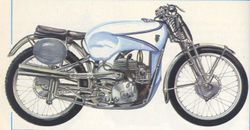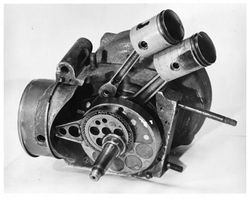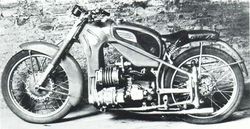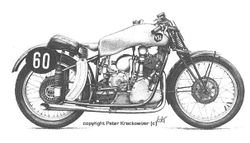From the moment NSU began producing motorcycles, it was chiefly concerned with racing vehicles. Its first Grand Prix motorcycles appeared about 1910. They were fairly advanced for the time, with a two-cylinder V engine (only 500-cc. but modeled after American motorcycles) and a rigid chassis with front fork elastic suspension. In 1930 NSU challenged Norton with a single-cylinder single-shaft model designed by Walter Moore. This vehicle had its moment of glory when the British racer Tom Bullus rode it to a 500-class victory at the Italian Grand Prix at Monza, Italy, in 1930. In 1936 the NSU 350 single-shaft motorcycle registered the fastest lap at Monza. The following year both the 350 and the 500 were equipped with two-shaft distribution.
 |
|
| NSU 350 Supercharged | |
| Manufacturer | |
|---|---|
| Class | Racing |
| Weight | |
| Manuals | Service Manual |
But the engine that was to lead to a series of top-notch racing motorcycles was not built until 1939. It was a four-stroke, two-cylinder engine with two-shaft overhead distribution and a volumetric vane supercharger. A 350-cc. version was readied first and then a 500-cc. model. The NSU two-cylinder with supercharger competed in the 1939 European championship, but it did not achieve brilliant results, and there was nothing to indicate that it would be the ancestor of a series of engines that would win world championships and set records. Motorcycle: NSU 350 with Supercharger Manufacturer: NSU, Neckarsulm Type: Racing Year: 1939 Engine: NSU two-cylinder, four-stroke, with two-shaft overhead distribution with two bevel gear shafts. Displacement 344.82 cc. (56 mm. x 70 mm.) Cooling: Air Transmission: Four-speed block Power: About 60 h.p. Maximum speed: About 125 m.p.h. Chassis: Continuous double cradle, tubular elements. Front and rear, elastic suspension Brakes: Front and rear, side drum


